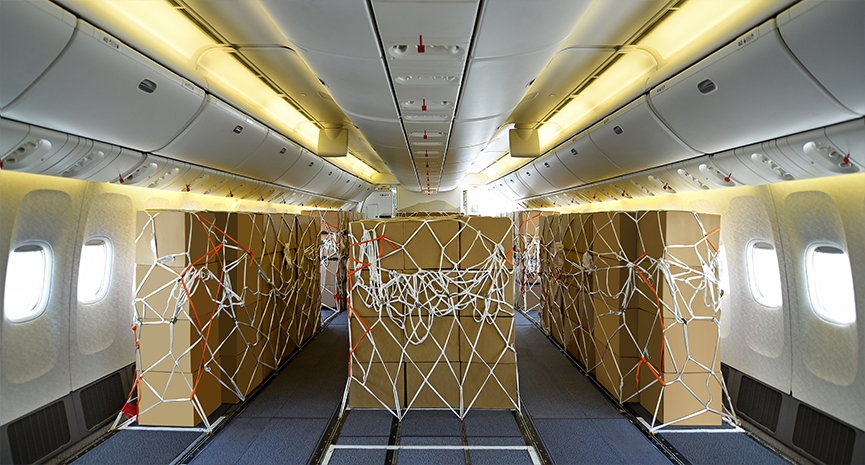Emirates modifies 10 B777-300ERs to meet cargo demand during crisis
Emirates has introduced additional cargo capacity by using 10 B777-300ER aircraft with seats removed from the economy class cabin.

June 25, 2020: In response to the strong air cargo market demand for the rapid, reliable and efficient transportation of essential commodities amid pandemic, Emirates has introduced additional cargo capacity by using 10 B777-300ER aircraft with seats removed from the economy class cabin. Seven aircraft have already been modified by the Emirates Engineering team, with three more aircraft due to be ready by mid-July 2020.
The aircraft can carry up to 17 tonnes or 132 cubic metres of additional cargo capacity per flight on top of the 40-50 tonnes of cargo capacity in the belly hold of the wide body passenger aircraft. The modified B777-300ER are being deployed on routes to key production and consumer markets where Emirates SkyCargo sees maximum demand for movement of urgently required goods - such as personal protective equipment (PPE), pharmaceuticals, medical equipment, food, machinery and other supplies around the world.

Emirates Engineering team removed 305 economy seats from one aircraft
Nabil Sultan, Emirates divisional senior vice president, cargo said, “Since the start of the Covid-19 pandemic, Emirates SkyCargo has been working flat out, first to re-connect a global network of more than 85 destinations and then to introduce capacity options that fit what our customers demand from us including passenger aircraft flying only with belly hold cargo and loading cargo in the overhead bins and on passenger seats. Now, with the Emirates Boeing 777-300ER aircraft, we will be able to transport even more cargo per flight, allowing for more cargo to reach their destination faster and for more efficient cargo operations.”
The modification is being executed at the state of the art Emirates Engineering facilities in Dubai with each aircraft requiring close to 640 man-hours of work for the modification. Engineers remove 305 economy seats from one aircraft, fixing safety equipment and implementing regular load bearing tests during the process.
Ahmed Safa, divisional senior vice president Emirates Engineering said, “Converting our passenger aircraft to these mini freighters is certainly a sign of the times. Our teams have shown resilience, an innovative spirit, and adapted quickly to the needs of the changing business environment. We have risen to the twin challenges of new procedures and safety protocols within set timelines, and we are extremely proud of what we have achieved.”
By the end of the project, the Emirates Engineering team would have removed 3,050 seats, which will be safely and hygienically stored away till the time the aircraft are required for passenger services. The seats will be fitted back into the aircraft and tested for passenger safety and comfort. The team is conducting regular parking checks on the grounded aircraft and scheduled A-checks, C-checks and operational maintenance on the flying fleet serving a mix of cargo and an increasing number of passenger destinations.


